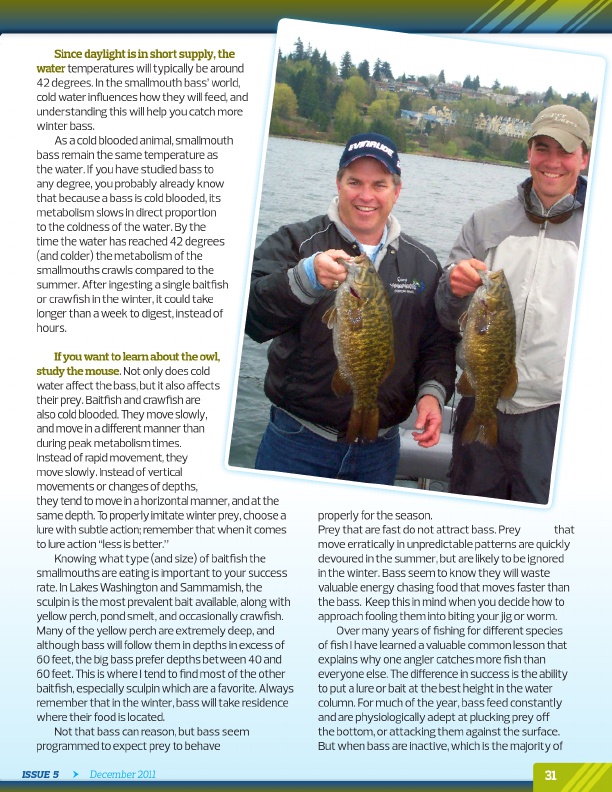
Since daylight is in short supply, the water temperatures will typically be around 42 degrees. in the smallmouth bass’ world, cold water influences how they will feed, and understanding this will help you catch more winter bass.
as a cold blooded animal, smallmouth bass remain the same temperature as the water. if you have studied bass to any degree, you probably already know that because a bass is cold blooded, its metabolism slows in direct proportion to the coldness of the water. By the time the water has reached 42 degrees (and colder) the metabolism of the smallmouths crawls compared to the summer. after ingesting a single baitfish or crawfish in the winter, it could take longer than a week to digest, instead of hours.
If you want to learn about the owl, study the mouse . Not only does cold water affect the bass, but it also affects their prey. Baitfish and crawfish are also cold blooded. They move slowly, and move in a different manner than during peak metabolism times. instead of rapid movement, they move slowly. instead of vertical movements or changes of depths, they tend to move in a horizontal manner, and at the same depth. to properly imitate winter prey, choose a lure with subtle action; remember that when it comes to lure action “less is better.”
Knowing what type (and size) of baitfish the smallmouths are eating is important to your success rate. in lakes Washington and Sammamish, the sculpin is the most prevalent bait available, along with yellow perch, pond smelt, and occasionally crawfish. Many of the yellow perch are extremely deep, and although bass will follow them in depths in excess of 60 feet, the big bass prefer depths between 40 and 60 feet. This is where i tend to find most of the other baitfish, especially sculpin which are a favorite. always remember that in the winter, bass will take residence where their food is located.
Not that bass can reason, but bass seem programmed to expect prey to behave
Issue 5 December 2011
properly for the season.
Prey that are fast do not attract bass. Prey
that
move erratically in unpredictable patterns are quickly devoured in the summer, but are likely to be ignored in the winter. Bass seem to know they will waste valuable energy chasing food that moves faster than the bass. Keep this in mind when you decide how to approach fooling them into biting your jig or worm.
over many years of fishing for different species of fish i have learned a valuable common lesson that explains why one angler catches more fish than everyone else. The difference in success is the ability to put a lure or bait at the best height in the water column. For much of the year, bass feed constantly and are physiologically adept at plucking prey off the bottom, or attacking them against the surface. But when bass are inactive, which is the majority of
31